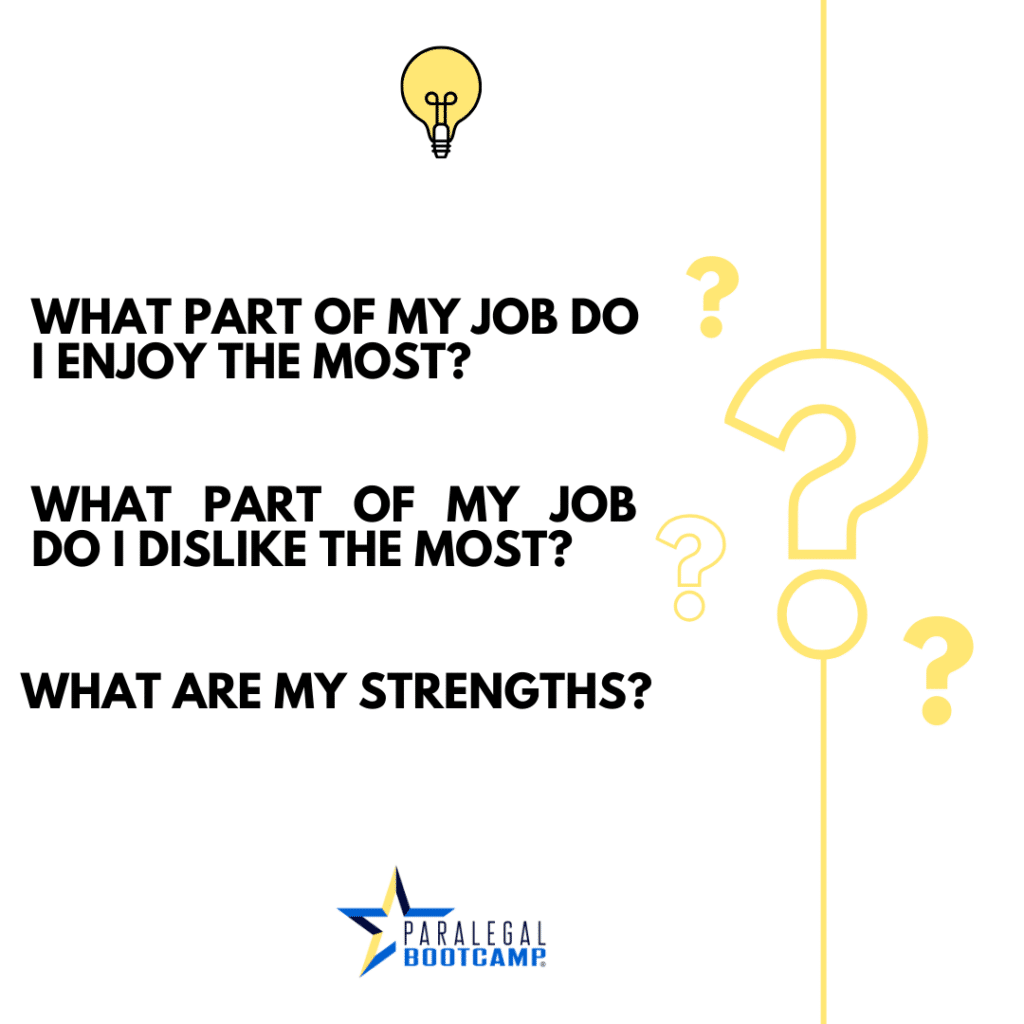The paralegal training and skills you’ve acquired throughout your paralegal career have opened the door to unlimited employment opportunities if you are looking for a paralegal career path that does not have a paralegal job title.
15 Alternative Career Paths for Paralegals:
- Legal Staffing Recruiter
- Professional Development and Training Manager
- Pro Bono Program Coordinator
- Project Manager for legal support vendor
- Legislative Affairs Director for a county government agency
- E-discovery Manager
- Professional Blogger/Marketer in the legal field
- Mediator
- Litigation Support Analyst
- Executive position at a venture capital company
- Foreclosure Specialist
- Contracts Administrator
- Compliance Specialist
- Investigator or Process Server
- Conflicts Specialist for a law firm
Prefer video instead of reading?
These are all actual job titles of people I personally know who were former paralegals.
Here are a few more that I came across in 2024 as I was updating this article:
VP of Operations
Career Coach
Data Privacy Specialist
Information Records Manager
Project Manager
Director of Legal Projects
Online Business Manager (OBM for a start-up company)
The list of alternative paralegal career options could be unlimited. Start by doing a Google search for one of the titles on the list, and you will discover even more job opportunities that you have gained from your prior paralegal career.
Maybe you’ve been a litigation paralegal for several years (or corporate paralegal, real estate paralegal…fill in any practice area here), and you’re looking for a career change. You might be interested in exploring some alternative paralegal career options.
🌟 Check out this interview with Ann where she talks about paralegals she’s met with alternative job titles.
Your paralegal degree, combined with your paralegal skills, can lead you to career options that utilize the skills you have acquired through your paralegal experience.
What do you enjoy most about being a paralegal?
Are you a litigation paralegal who enjoys networking and sales conversations?
Then maybe a sales position for a legal vendor would be a better fit than managing document review projects as a litigation paralegal in a typical law firm setting. I interviewed an eDiscovery Vendor on the podcast and asked them what it takes to go from a litigation paralegal to an eDiscovery project manager.
🔊 Listen to their answer here.
Are you a litigation paralegal who has been working with e-discovery tools? Maybe you would enjoy working for an e-discovery software company as a project manager.
E-discovery Boot Camp
E-discovery skills are no longer on that list of “preferred” skills when employers are hiring litigation paralegals. These skills are required now.
Don’t limit your future career security by not knowing how to manage e-discovery projects.
This e-discovery training program will help you become a master at e-discovery project management in just 5 hours!

I had a podcast interview with Kim Bookout, who has a very rewarding position at a tech company after many years of working as a litigation paralegal and a litigation support specialist. She gives you an idea of where your litigation experience can take your career.
🔊 Get the podcast episode here.
Are you a corporate paralegal who enjoys the operations and financial side of managing projects and have an undergraduate degree in business management?
Then maybe you would be better suited for a VP of Operations or an Online Business Manager that would allow you to combine your education with your paralegal skills. That “OBM” title has really grown post-pandemic.
Your paralegal skills open up doors
Kristine Wilder, Manager of Records & Information Management for Walt Disney Company, agreed, “It has been many years since I worked as a litigation paralegal, but I continue to use my paralegal skills every day in my position.”
Wilder now uses those skills to assist her and her team when they are establishing new information compliance policies for over 195,000 employees across the various business divisions of the Walt Disney Company. Wilder now feels like she is charting her own course every day and not limited by views that she can only do a limited type of work or have limited interactions.
When you move outside the law firm and corporate legal department, you also move away from the labels we have all grown accustomed to in the legal industry: paralegal/attorney, attorney/non-attorney, or professional/staff. Wilder added, “In my current role, there are no labels or limits to what I can achieve. Without limits, I now enjoy driving initiatives, looking at the big picture of the company, and how I can best serve the company without any restrictions that hold me back in my position here.”
When you are thinking it might be time to start Act II of your career, consider drafting up a plan to help you evaluate your options and decide which career path you might want to take.
👉 Learn about pursuing a career in compliance and privacy.

Your Step-by-Step Action Plan
Step 1: Do a self-assessment
Ask yourself those questions above. What parts of your paralegal job do you enjoy the most? What parts do you dislike the most? What are your strengths?
I did that exact thing in 2010 before I started the Paralegal Boot Camp.
When I answered them, it looked like this:
What part of my job do I enjoy the most? Developing training for paralegals that make it easier for them to excel in their career.
What part of my job do I dislike the most? The HR side of things, like hiring and firing, budgets, and firm politics.
What are my strengths? Having a true understanding of how to bridge the gap between what a paralegal learns in a paralegal certificate program and what skills are needed to be a successful litigation paralegal.
Step 2: Know what the new field requires for success
Some career alternatives might require some additional training or education specific to that industry when you decide to make the career transition from paralegal to another field. Find out what those are before you make any decisions about your paralegal career options.
For example, if you are considering a teaching job, you would have more options available to you if you had a master’s degree. If you are interested in a sales position, you might want to take some courses on sales techniques.
You would also want to talk to as many legal support vendors as possible to learn what it takes to be successful in that position. Make sure you understand the pros and cons of any role you are considering transitioning to.

Step 3: Update your paralegal resume
If you have spent most of your career working as a paralegal in a law firm, it’s probably been a while since you took a look at your resume. Now you will need to look at it from a different perspective. That’s why I recommend that you update your paralegal resume every year, even if they’re not currently looking for other employment opportunities.
- Start by updating your resume with your current paralegal skills.
- Grab that research you did in Step 2.
- Search online for similar positions that are advertised.
- Copy and paste the preferred and required skills from the top 3 positions and put them in a Google Doc.
- Upload both lists to ChatGPT and ask it to update your resume bullet points to make your skills more relevant to the job advertisement.
- Now review the results and edit them so they don't sound like they were written by robot!
Litigation Paralegal Boot Camp
Are you tired of being the Panic Mode Paralegal who spends your days playing whack-a-mole with last-minute rush projects because you’re waiting for someone to show you what it takes to be great litigation paralegal?
This is the only program of its kind that provides litigation paralegals with all of the tools to master litigation cases from the complaint through the trial, and everything in between.
You will be the Confident Case Strategist faster than you ever imagined possible.

What if you're just starting your paralegal career?
I would recommend you get at least 5 – 10 years of experience working as a paralegal first. And find training for paralegals that adds skills and not just CLE certificates in a file drawer!
Most of these alternative paralegal positions discussed here were the result of the tremendous amount of skills gained throughout a paralegal’s career.
You can start by getting a 5-year Career Plan. It’s not what you think it might be!
👉 Watch this video for a different way of reaching your goals.
Meet the Author

Ann Pearson is the Founder of the Paralegal Boot Camp and host of the Paralegal Coach Podcast Show. Ann is passionate about promoting the paralegal profession.
Ann spent 20 years working as a paralegal manager and a litigation paralegal before opening the Paralegal Boot Camp in 2010.
Ann’s training programs focus on adding immediate value to a paralegal’s career and bridging the gap between what a paralegal learns in school and what they actually do on the job.
Visit the About Us Page to learn more about why Ann started the Paralegal Boot Camp.

























